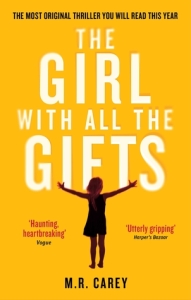(I’ll try not to reveal too much in this review, but there’s probably spoilers in here. I read a spoiler before I read the book and it didn’t damage my enjoyment though… In fact knowing the early “twist” helped me make sense of the initial chapters and might have increased my enjoyment…)
Zombies. Zombies. Zombies.
Zombies, everywhere! While Twilight brought in a vampire fad for a time, The Walking Dead has brought zombies back to the mainstream with a gory vengence!
Of course, for those interested in comics and all things geeky, zombies are a constant meme running through culture. Similar to the fascinating and recurring debate on “When is a strawberry dead?” (on the great BBC radio 4 show The Infinite Monkey Cage), zombies make us confront two things: the very nature of death and, in particular, death of the individual (the soul?) and the issue of… THE APOCALYPSE!
I wrote a little about the apocalypse in my review of Station Eleven. Suffice it to say, that the theme lets writers address aspects of human existence with the training wheels of society taken off.
In the case of this book (which is intelligent, thrilling, pacy and a VERY GOOD READ) the theme is it addresses is humanity or, more precisely, when does humanity start and when does it end?
The author, M R Carey, is a seasoned comic book writer, and it shows. I’m a seasoned comic book reader and I can see this book in a very visual way. Many of the themes and archetypes addressed in it are standard comic book/ geek culture tropes.
The Junkers. The characters (all, at least initially, stereotypes). The zombies. The landscape. All very very standard.
But this book isn’t standard. About 6 chapters in I feared it would be. But it isn’t. Here’s what sets it apart:
Melanie. She’s great. She’s an intelligent kid with self awareness but she always feels like a kid. This connection to childhood is maintained through her devotion to her teacher. Melanie is fully realised and the big reveal at the end makes so much sense not only because of a cyclical “ah!” moment, but also the emotional sense it makes to the book’s best and most central character, Melanie.
The explanation. Sometimes I like it when apocalyptic tales DON’T explain the BIG BAD REASON (eg: Y The Last Man) but when it’s done well (scientific enough to be reasonable and not enough to be unintelligible) it adds a whole sub layer of depth and pathos. M R Carey does it so well here. The reasoning explains Melanie. It explains each character’s motivations. And it explains and illuminates the ending.
The big shift in pace. For a brief time near the beginning I was worried that the book might lack pace. I loved the start, but there was a moment when I was concerned that the book would be confined to … well the confinement area. Then the big attack and, like a conductor downing a Red Bull, the tempo bursts forth and doesn’t stop. It doesn’t stop until the ending, which drops the pace to a soft calm inevitable dream-like climax which feels, after the read, the only and most complete end.
This is a book written by someone at ease with fiction, comics, quality TV and popular culture (M R Carey wrote the screenplay adaptation for this at the same time as the novel). It’s the perfect book for someone looking for a very well-written, well-paced and well-populated novel. It has a hefty mix of quasi-scientific ideas, emotional resonance and a plot that storms along like Snowpiercer.
Buy it. Read it. Wait for the movie.
